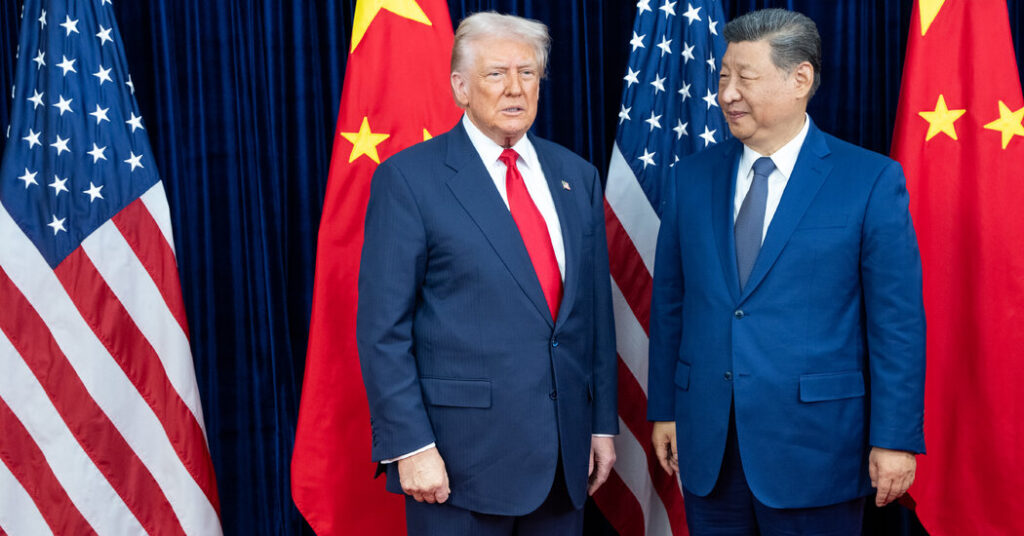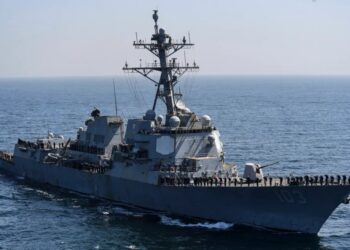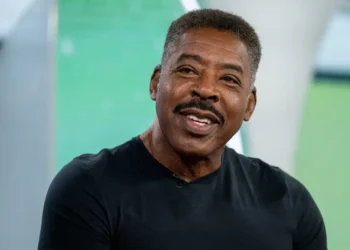If anyone needed evidence that a critical moment is developing in Asia-Pacific diplomacy, look no further than the phone call on Monday between Xi Jinping, China’s top leader, and President Trump.
Mr. Xi reached out to Mr. Trump because a Japanese leader is taking her country’s strongest stance since World War II to assert that Taiwan’s security is also Japan’s security. While that has long been apparent to military planners, given Taiwan’s proximity to southern Japan — and also to U.S. bases there — Japan’s new strategic posture has alarmed Beijing’s leaders.
China has been doing everything possible in recent years to isolate Taiwan, an island democracy, and persuade other countries to accept Beijing’s claim to sovereignty there. Most countries have switched diplomatic recognition from Taipei to Beijing, leaving Taiwan increasingly friendless. Countries like Lithuania and the Czech Republic that dare to contact Taiwan informally face swift retribution from Beijing. Chinese air and naval patrols circumnavigate Taiwan with increasing frequency.
So few observers expected Japan’s new prime minister, Sanae Takaichi, to immediately take a tough stand toward China. But on Nov. 7, she told Parliament that an effort by China to blockade or invade Taiwan would be a “survival” issue for Japan, a term that has legal implications in Japan by permitting an overseas deployment of its military Self-Defense Forces.
Ms. Takaichi’s comments were among the strongest ever by a Japanese leader about helping to defend Taiwan, although former President Joseph R. Biden Jr. made similar remarks four times while in office.
China responded with a series of economic, military and diplomatic measures against Japan. But Japanese officials are not backing down. During a trip on Sunday to a military base on the southern Japanese island of Yonaguni, located about 70 miles east of Taiwan, Defense Minister Shinjiro Koizumi confirmed his country’s intention to proceed with plans to deploy medium-range antiaircraft missiles at the outpost.
The call on Monday by Mr. Xi to President Trump “comes amidst arguably the most serious crisis in China-Japan relations in over a decade — China is exerting an enormous amount of pressure on Japan, likely out of a belief that Tokyo will blink,” said David Sacks, a fellow for Asia studies at the Council on Foreign Relations.
President Trump, apparently relishing his role being sought after by Japan and China, had a phone call with Ms. Takaichi hours after his conversation with Mr. Xi. Mr. Trump avoided tipping his hand publicly on whether he would yield to Chinese pressure to shift decades of American support for Taiwan, saying only that he planned to travel to Beijing next April.
Mr. Xi and his foreign minister, Wang Yi, have swiftly ratcheted up the diplomatic stakes by presenting China as the guarantor of the post-World War II global order — and by portraying Taiwan and its defenders as challengers to that order.
“It is shocking that Japan’s current leaders have publicly sent the wrong signal of attempting military intervention in the Taiwan issue, said things they shouldn’t have said, and crossed a red line that should not have been touched,” Mr. Wang said on Sunday.
According to a statement from Beijing, Mr. Xi emphasized to Mr. Trump that “China and the U.S. fought side by side against fascism and militarism; now, they should work together to safeguard the achievements of the victory in World War II.”
John Delury, an historian of Northeast Asia who is a senior fellow in Seoul for the Asia Society, said that Mr. Xi “is trying to get out a big narrative of Beijing as the guardian of the postwar international order.”
.
After months of feuding with the United States over President Trump’s tariffs, China and Japan now both want American support for their respective positions on Taiwan. That has strengthened the bargaining position of President Trump, who has sought Beijing’s help this autumn to buy American soybeans, supply rare earth metals and limit China’s financial and industrial support for the Russian war effort in Ukraine.
Beijing has halted seafood imports from Japan, canceled concerts in China by Japanese performers, halted many flights to Japan and discouraged Chinese tourists and students from visiting Japan. Three Chinese warships sailed past a Japanese island four days after Ms. Takaichi’s remark, and four Chinese armed coast guard ships have since passed close to Japanese-administered islands north of Taiwan. And China has asked the United Nations to distribute a strong criticism of Ms. Takaichi’s remark to member countries.
Japan has pushed back. It has submitted a written riposte to the U.N. and insisted that its planned missile deployment — which Japanese officials say is for the country’s own defense rather than projecting force — will proceed on Yonaguni Island, east of Taiwan. Public sentiment in Japan seems to support the country’s leader.
“The more pressure China exerts on Japan, the more Japan feels compelled to prepare, recognizing the growing danger — Prime Minister Takaichi’s approval ratings are rising, and the Japanese people’s sense of crisis is also increasing,” said Ichiro Korogi, a professor of international studies at Kanda University of International Studies.
The tensions come as China has taken a long series of measures to strengthen its strategic position not just against Taiwan but also toward Japan and South Korea. China has built the world’s largest navy, part of a rapid military buildup that also includes intercontinental ballistic missiles and advanced airborne and underwater drones. China sent two aircraft carrier task forces last summer through part of Japan’s exclusive economic zone.
Mr. Xi welcomed the leaders of Russia and North Korea to a military parade in Tiananmen Square in early September, then sent his premier, Li Qiang, to a military parade six weeks later in Pyongyang, the capital of North Korea. Both events showcased that three countries with nuclear weapons — China, Russia and North Korea — were united as they face Japan, South Korea and Taiwan — none of which, at the insistence of the United States, has developed its own nuclear weapons.
Chinese naval vessels have been operating with increasing frequency around the circumference of Taiwan in the past several years. The Japanese antiaircraft missiles have less than half the range to reach Taiwan, much less mainland China. But they could be a concern for China in providing air cover for activities east of Taiwan.
On Monday, Mao Ning, a spokeswoman for China’s foreign ministry, criticized Japan’s missile-deployment plans.
“Japan’s deployment of offensive weapons in southwest islands close to China’s Taiwan region is a deliberate move that breeds regional tensions and stokes military confrontation,” she said. “Given Japanese Prime Minister Sanae Takaichi’s erroneous remarks on Taiwan, this move is extremely dangerous and should put Japan’s neighboring countries and the international community on high alert.”
Her comments, along with Mr. Xi’s and Mr. Wang’s evocation of Japan’s World War II sins, seemed to be another open effort to persuade Mr. Trump to start looking at security questions from China’s perspective.
In fact, China’s leaders are now presenting themselves so strongly as guardians of the existing international order that they sometimes sound like former President Biden, Mr. Delury, the Northeast Asia scholar, said. And in the phone call on Monday, he added, Mr. Xi was “using Biden’s language in appealing to Trump for some level of support.”
Chris Buckley, Li You and Amy Chang Chien contributed reporting and research.
Keith Bradsher is the Beijing bureau chief for The Times. He previously served as bureau chief in Shanghai, Hong Kong and Detroit and as a Washington correspondent. He lived and reported in mainland China through the pandemic.
The post China and Japan, With Trump in the Middle, Stoke an Existential Showdown appeared first on New York Times.




